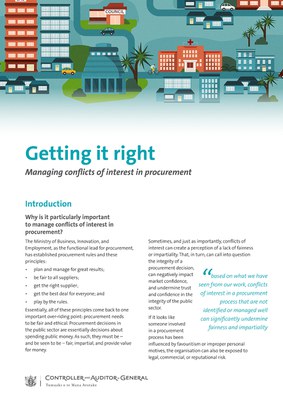Managing conflicts of interest in procurement
 The Ministry of Business, Innovation, and Employment, as the functional lead for procurement, has established procurement rules and these principles:
The Ministry of Business, Innovation, and Employment, as the functional lead for procurement, has established procurement rules and these principles:
- plan and manage for great results;
- be fair to all suppliers;
- get the right supplier;
- get the best deal for everyone; and
- play by the rules.
Essentially, all of these principles come back to one important over-riding point: procurement needs to be fair and ethical. Procurement decisions in the public sector are essentially decisions about spending public money. As such, they must be – and be seen to be – fair, impartial, and provide value for money.
Based on what we have seen from our work, conflicts of interest in a procurement process that are not identified or managed well can significantly undermine fairness and impartiality.
Sometimes, and just as importantly, conflicts of interest can create a perception of a lack of fairness or impartiality. That, in turn, can call into question the integrity of a procurement decision, can negatively impact market confidence, and undermine trust and confidence in the integrity of the public sector.
If it looks like someone involved in a procurement process has been influenced by favouritism or improper personal motives, the organisation can also be exposed to legal, commercial, or reputational risk.
Common ways that conflicts of interest in procurement processes arise
Public sector procurement bridges the boundary between the public, private, and voluntary sectors. One of the reasons concerns about conflicts of interest in procurement often arise is that procurement decisions involve these different sectors interacting. Each sector might have different ideas about what is appropriate.
Conflicts of interest can arise in several different ways. These include:
- employment relationships – an individual may have previously worked for (or with) a tenderer
- financial interests – an individual may have a financial interest in a company that has tendered for a contract
- business relationships – an individual may have received a gift or hospitality from a potential provider
- family or personal relationships – an individual may also have a conflict of interest through a family member or friend.
Regardless of how the conflict arises, there is a risk that an individual with a conflict might (consciously or unconsciously) pass on information or make comments about a procurement to potential providers that create an unfair advantage or improperly influence a decision-making process.
Even if these things don’t happen, managing perceptions is as important as managing actual conflicts of interest.
We have prepared six common scenarios where conflicts of interest can arise during procurement. We set out:
- why the scenario represents a conflict of interest
- how it might affect trust and confidence, and
- why some proposed mitigations may not fully address the risk.
We also provide some ways to help avoid, mitigate, or manage the conflicts.
